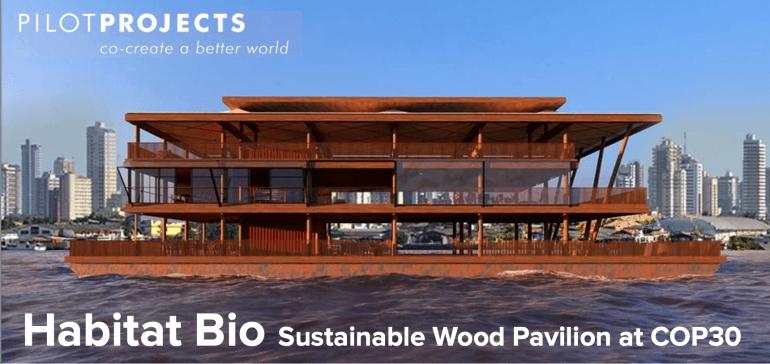

30.05.2025
An emblematic pavilion built from sustainable Amazonian wood to carry the voice of the bioeconomy and sustainable forest management to Belém.

A unique, innovative and inspiring project is about to take shape for COP30, to be held in November 2025 in Belém (Brazil): Habitat Bio, a floating pavilion made from wood from sustainably managed forests, imagined as a place for meetings, debates and a life-size demonstration of the potential of the forest bioeconomy.
Spearheaded by Scott Francisco and his team at Pilot Projects Collaborative, Habitat Bio is more than just a building: it's an immersive experience, a vibrant call to action for tropical forests, tangible proof of what sustainable forest management (SFM) can deliver in terms of conservation, development and innovation.
Three pillars to save the world's great forests
After a trip to the Amazon, Ecuador and Guyana, Scott Francisco reaffirmed his firm belief that SFM is essential to the triptych of forest conservation, alongside public funding and carbon mechanisms. It offers a concrete and balanced way of combining conservation, economic development and responsible use of resources.
At COP30, the Habitat Bio pavilion will be the ideal place to illustrate this vision and mobilize the international community around a replicable, resilient and equitable model.
An unusual pavilion, anchored in Belém
Habitat Bio's three-storey building will be able to accommodate up to 200 people for conferences, panels, workshops and receptions. The building will be entirely solar-powered, with a water filtration system designed to operate autonomously, even in remote areas.
Two mooring sites have been approved by the city of Belém and the Federal University of Pará, in the immediate vicinity of the COP site. Thanks to a simple towing system, the pavilion can be moved as required.
A flexible and inclusive partnership strategy
The financing model is based on a hybrid approach, enabling a diversity of players - NGOs, governments, businesses - to commit to different levels of contribution and access to spaces and events. Four types of partnership are available:
Each partner will benefit from high visibility, exclusive usage slots, logistical support to organize high-impact events, and a feature in the documentary film dedicated to the project.
A post-COP legacy for a committed future
Following COP30, the pavilion will be made available via a call for expressions of interest (RFP). The organization that takes over will define the site's new mission - educational center, awareness-raising venue, research or innovation hub - in line with its ongoing commitment to the climate, biodiversity and local communities.
Join the movement
Time is of the essence: construction is due to start at the beginning of July, and the coming weeks will be decisive in finalizing financing. All partnership proposals are welcome. Together, let's make Habitat Bio a global showcase for low-carbon architecture, international cooperation and sustainable tropical forest management.
For further information or to make a contribution: cop30@pilot-projects.org